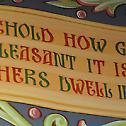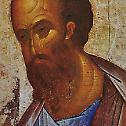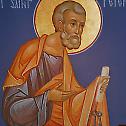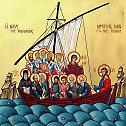Opposing Racism: Commending our Life to Christ
“Happy is he whose help is the God of Jacob, whose hope is in the LORD his God, who made heaven and earth, the sea, and all that is in them; who keeps faith for ever; who executes justice for the oppressed; who gives food to the hungry. The LORD sets the prisoners free; the LORD opens the eyes of the blind. The LORD lifts up those who are bowed down; the LORD loves the righteous. The LORD watches over the sojourners, he upholds the widow and the fatherless; but the way of the wicked he brings to ruin. The LORD will reign for ever, thy God, O Zion, to all generations. Praise the LORD!” (Psalm 146:5-10)
In many Orthodox churches, it is customary to sing the above Psalm 146 at the Eucharistic Liturgy. The Psalm expresses an ideal for the life of the people of God and how we are to be godlike, and to act toward the stranger, the sojourner and the oppressed with the same intention as God Himself: executing justice for them all. In fact, we are to treat them as we would wish to be treated (Matthew 7:12).
It is for this same reason, this same vision, that the Orthodox in America need to stand together with those who oppose racism and bigotry. It is why we believers need to oppose white supremacist or neo-Nazi groups: such ideology goes against the very understanding we have of God, of what it is to be human and of Christianity. All humans are called by Christ into a holy unity. It may be natural to us to identify with people like us – same ethnicity, or race or social class. These may be the people we spend the most time with, marry and live with in our neighborhoods. Scripture itself has a great deal of “us” and “them” thinking. We can choose to live with and marry people like ourselves, but in Christ, we are to treat all others – the stranger, the alien – as we treat people like ourselves. St. Paul writes forcefully:
“… remember that you were at that time separated from Christ, alienated from the commonwealth of Israel, and strangers to the covenants of promise, having no hope and without God in the world. But now in Christ Jesus you who once were far off have been brought near in the blood of Christ.
For he is our peace, who has made us both one, and has broken down the dividing wall of hostility, by abolishing in his flesh the law of commandments and ordinances, that he might create in himself one new man in place of the two, so making peace, and might reconcile us both to God in one body through the cross, thereby bringing the hostility to an end. And he came and preached peace to you who were far off and peace to those who were near; for through him we both have access in one Spirit to the Father. So then you are no longer strangers and sojourners, but you are fellow citizens with the saints and members of the household of God, built upon the foundation of the apostles and prophets, Christ Jesus himself being the cornerstone, in whom the whole structure is joined together and grows into a holy temple in the Lord; in whom you also are built into it for a dwelling place of God in the Spirit.” (Ephesians 2:12-22)
Our vision as Orthodox calls us to this peace in Christ – to live at peace with those who are our neighbors. As Christ taught, the real question is not “who is my neighbor?” but rather “how can I prove myself to be a neighbor to those I meet?” (Luke 10:29-37, the parable of the Good Samaritan). We Orthodox in America need to prove we are Christ’s neighbor by standing against violence and racism and hatred, by siding with those we think of as the stranger, the alien, the sojourner. Many of us Orthodox came to America as strangers and aliens (or our ancestors did), and many Orthodox as immigrants encountered prejudice and hatred for no other reason than our names, our languages, our Orthodox Faith. Our message within our parish communities is to be Christ’s message of being neighbors, of love, of caring for the oppressed. Our Communion is with Christ, not with those who practice or preach hatred and violence nor with those who teach any form of racism.
We would do well to remember our scriptures and the story of the great flood, and what prompted God to want to drown evil and send it back to the depths of the sea out of which it came:
“Now the earth was corrupt in God’s sight, and the earth was filled with violence. And God saw the earth, and behold, it was corrupt; for all flesh had corrupted their way upon the earth.
And God said to Noah, “I have determined to make an end of all flesh; for the earth is filled with violence through them; behold, I will destroy them with the earth.” (Genesis 6:11-13)
Those promoting violence and hatred embrace a way of life which God has hated (Isaiah 59:7-8; Psalm 11:5-6; Proverbs 6:16-19) throughout the existence of the human race.
We Orthodox Christians are called to be one race, a race united in Christ, not based on genes but on faith and holiness:
“But you are a chosen race, a royal priesthood, a holy nation, God’s own people, that you may declare the wonderful deeds of him who called you out of darkness into his marvelous light. Once you were no people but now you are God’s people; once you had not received mercy but now you have received mercy. Beloved, I beseech you as aliens and exiles to abstain from the passions of the flesh that wage war against your soul. Maintain good conduct among the Gentiles, so that in case they speak against you as wrongdoers, they may see your good deeds and glorify God on the day of visitation.” (1 Peter 2:9-12)
If we pay attention in the Divine Liturgy, we realize all of us share in the same life. The Liturgy doesn’t speak about “lives” but life (in the singular, one life shared by all of us):
let us commend ourselves and each other and all our life unto Christ our God.
enable us to serve You in holiness all the days of our life.
May the Holy Spirit Himself minister together with us all the days of our life.
I look for the resurrection of the dead, and the life of the world to come
For a Christian ending to our life: painless, blameless, and peaceful;
To You we commend our whole life and our hope, O loving Master.
We all share the same life given to us by God which is why we need to stand with those whose life is threatened by those who rant and rail for violence, hatred and racism. Life is precious and sacred. Racism precisely denies “our life” – our common humanity which Christ took on in the incarnation – the one human life given to us all by our Creator.





